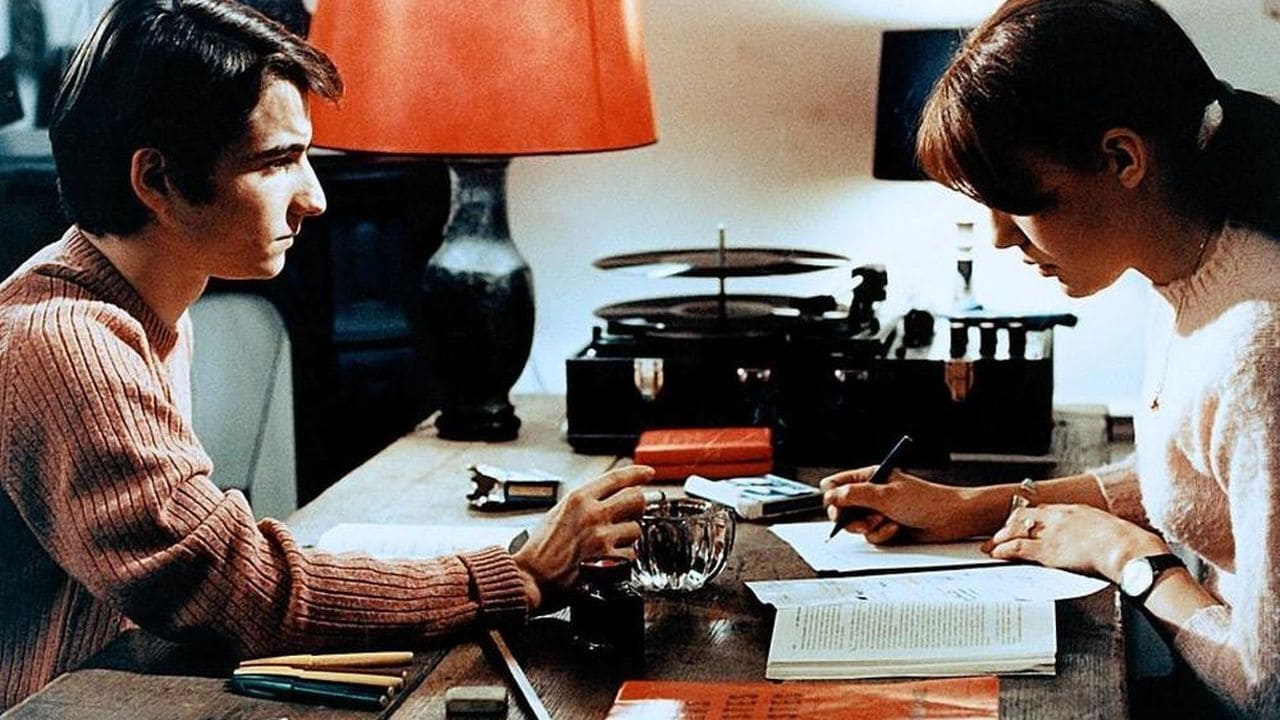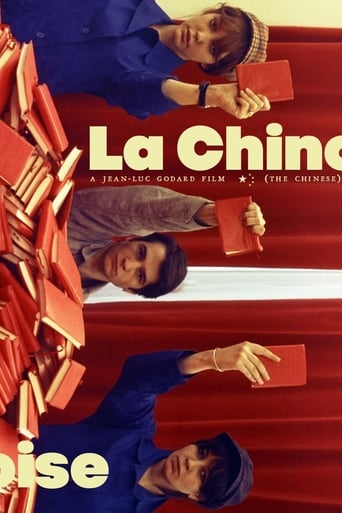Jeanskynebu
the audience applauded
Solidrariol
Am I Missing Something?
ChicRawIdol
A brilliant film that helped define a genre
Cristal
The movie really just wants to entertain people.
tcorgat
Godard's La Chinoise is truly a remarkable and utterly unique film. This one and Week end are both the highlights of his progression from his earlier new wave, Hollywood inspired films, to more experimental and avant-garde ones. For those interested in good stories and plot this one will be a bore. For those that are also interested in good directing, camera shots, angles, long takes, brilliant cinematography (man the red colours), minimalism, cool editing of both sound and picture, La Chinoise is exactly what they want.It's very important to be familiar with the time period (late sixties), in both culture and politics. And of course, with communism, especially Maoism. Now some people may think of this film as an "ode to communism", while others may say that it's more like tongue-in-cheek. Whatever it may be, the film is simply brilliant.What we have is bunch of young people in an apartment, reading books, quoting Mao, having discussions, presentations and witty dialogue, about loads of subjects such as: Love, Vietnam war, Communism, capitalism, language, terrorism, knowledge, etc. That is the whole plot of the film, but the film language here is much more deep and rich, as mentioned before.My rating is pure 10/10.
rotildao
Well, it is a great Goddard. Touches in a subject that is presently seen in Brasil. The fall of the so called "political last hope", the left wing. What the french and Chinese felt 30 or 40 some years ago is now reflecting within our delayed and useless democracy. By the way, democracy does not exist, and never did anywhere, period. Anyway, the film's form, symbolisms and dialogs (which are great) are deliberately constructed to catch the intellectualized audience attention. Why? First, it's Goddard. Second, he is showing his frustration towards a society in the turn of tides. Goddard knows his generation has failed, like many did, and the future is in the hands of clueless people who may not even know what their ideals were. There are many conflicts present in the film, and like any transition period in life conflicts will occur with various opinions about the same subject; however, use to have one symbolic goal, from now on the results will create individual solutions, and instead of uniting people they will actually divide us all and distract us from the importance of communion. The "needing" of one another as a society will be incorporated into peoples lives as a simple need to succeed in a capitalistic world where any person becomes replaceable and without self identity. This is what Goddard, back in 68, was trying to tell us. Did he accomplished that? Well, look at how many people care to vote or comment on this movie and how many did on Star Wars. The shrinking importance of subject in films shows us the importance of visual effects, how's that for a comparison? Goddard knew it all the time what was to come.
minsker2000
Having prided myself on seeing almost every Godard film, I was thrilled to learn that the National Gallery of Art (in Washington, DC) had secured a copy of LA CHINOISE from the British Museum. I've been waiting to see this film for at least 10 years. The 35 mm print, with its fading color and spotty sound, is one of the few available in the world today (though I've since been informed that bootleg VHS copies, with no translation, can be easily scored in Europe and elsewhere).As James Travers notes above, this is certainly Godard's most political film. Filmed in 1967, during the Vietnam War, this movie is more a critique of the half-baked philosophies of the student revolutionaries than it is of the war itself. Granted, Godard was quite aware of the stains (left by the colonization of Vietnam) on the French collective unconscious. And he certainly was disgusted by America's arrogant actions towards stopping the spread of communism (which he touches upon in TWO OR THREE THINGS I Know ABOUT HER). But in LA CHINOISE, his political commentary is aimed at the pseudo-intellectual revolutionaries in Paris (predating the Paris 1968 riots) who talk a big game but have difficulties assassinating the right individuals and who morph Marxist philosophies into unrecognizable doctrine that comically controls their lives.The film, which is not widely known or seen, has keen implications for our world today. In our "post 9-11 world," fundamental terrorists have attacked "Western targets" for their secular views and their secular conventions of society (such as television, internet, business, and art). In Godard's film, the student revolutionaries want to force the "puppet universities" to close because they promote a bourgeois lifestyle and bourgeois attitudes. The irony is that their understanding of Marx or Engles or Mao or Che Guevara comes directly from their experience in said bourgeois institutions. And yet, out of this, they find themselves better than or above the others also seeking knowledge and truth. Today, in 2004, there are terrorists who reject the secular nature and influence of western culture, and yet they use Microsoft software, Flash, and Adobe Photoshop to broadcast images of beheaded soldiers and civilians -- in a supposed "Anti-western statement." This film, which runs exactly 90 minutes and features some of the best music (reminiscent of Harry Partch at times; other times, it features fuzz 60s rock with lyrics praising all things Mao), points out the ironies of any revolutionary willing to be taught, attend meetings, and go "by the book."Godard
sleepsev
There are many great things about 'La Chinoise', including its political and historical importance, which have been elaborately discussed by film enthusiasts all over the world, so I'd like to add only my very personal thoughts about this film. Personally, 'La Chinoise' stands very much apart from, if not above, all of the films I've seen. While other films of Godard make me feel they are great movies, 'La Chinoise' doesn't make me feel like that. It makes me feel as if I hadn't seen a film, as if I'd just had a very nice and exciting conversation with friends, as if I'd just had a very lively discussion with them, as if I'd just participated in a hot debate, as if I'd just quarreled with some people. No film ever made me feel like this.Scenes and dialogues worthy of remembering in 'La Chinoise' are as innumerable as in other films of Godard. Forever imprinted on my memory are the scenes when Leaud can't understand what his girlfriend says without the help of music, the droll assassination scene, and most important of all, the discussion on the train. This train scene looks so simple, yet it is very subtle and powerful. I saw 'La Chinoise' the first time four years ago, and I felt very detached from the movie. Seeing it again, I think it is one of my most favorite now.

